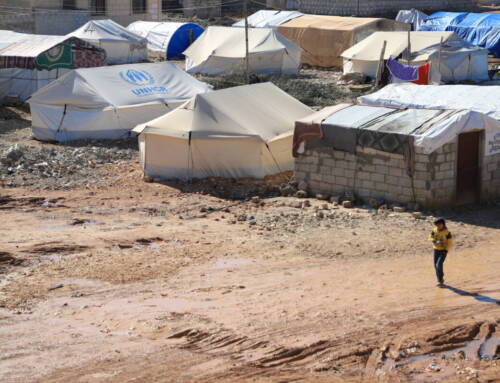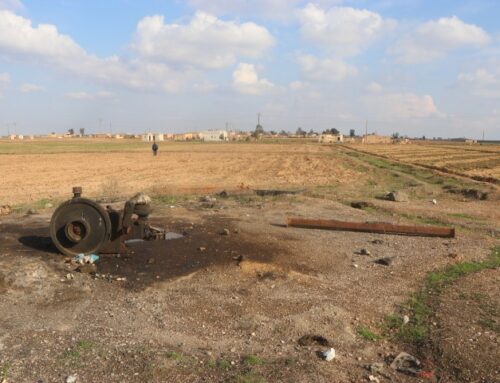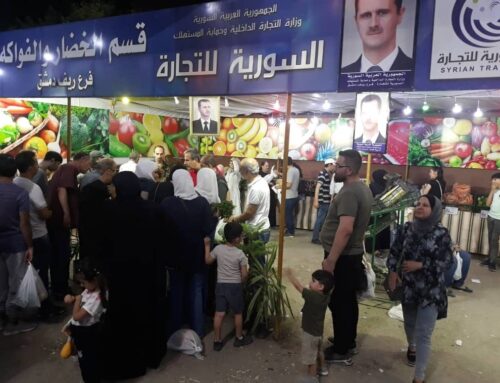Offering installment plans for Eid clothing, traders look to revive Hama’s markets
In Hama, some shops are offering installment plans of up to six months for struggling Syrians to buy new clothing for Eid.
28 April 2022
HAMA — For years, Abu Munir has relied on the principle of “taking turns” when buying Eid apparel for his three children—assigning each holiday to a particular child and buying them clothing, “usually from second-hand shops.” But this year, in preparation for Eid al-Fitr, he bought three new shirts at once, taking advantage of “installment plans for clothing,” which recently became popular in Hama.
Together, the three shirts cost SYP 60,000 ($15 according to the parallel market exchange rate of SYP 3,850 to the dollar), or more than half of Abu Munir’s monthly salary of SYP 112,000 ($29) as a public sector employee.
Although Syrian President Bashar al-Assad issued a legislative decree on April 21 ordering a one-time financial grant of SYP 75,000 for “civilian and military state employees and pensioners,” the amount does not cover the cost of a pair of men’s pants and shoes, Abu Munir told Syria Direct. “Pants, on average, cost SYP 50,000 [$13], as do shoes,” he said, not to mention sweets, which “are at least SYP 25,000 [$6.50].”
In Syria, buying new clothing, particularly for children, is a tradition on holidays such as Eid al-Fitr and Eid al-Adha.
Abu Munir estimated the cost of a new outfit for one child at around SYP 100,000 ($26). This year he only bought shirts, looking to not deprive his children of the joy of Eid while also avoiding even higher financial burdens for years to come.
This month, the father of three entered into an agreement with the owner of a clothing store to pay the amount owed in “three equal installments.” To ensure payment, “I signed a promissory note that payment is due at the beginning of every month, and provided all my personal information, my place of work, and a communication method,” he said.
For those who benefit from them, installment plans may restore some of the joy of holidays and events that has been missing from Eid al-Fitr preparations this year in Hama and across Syria, due to unprecedented high prices and Syrians’ low purchasing power. This year is particularly difficult for people with limited income, due to the deterioration of the Syrian pound’s exchange rate.
Installment selling mechanism
In a country where more than 90 percent of the population lives below the poverty line, according to UN Under-Secretary-General for Humanitarian Affairs Martin Griffiths, many people are “forced to make very difficult choices to make ends meet.” Installment plans may be a solution for buyers and sellers, but are not without “the risk of fraud,” Omar, a trader in the children’s clothing sector, told Syria Direct.
Because of that, traders seek to safeguard their rights in a number of ways, the best of which is “selling the item in exchange for two payments, on condition of holding the buyer’s identification card until the full amount is paid,” Omar said.
Other traders have gone as far as to divide the sum into four monthly payments, with some giving customers a repayment period of up to six months, “provided that the customer signs a pledge to pay it in the specified time or be prosecuted for fraud,” Omar said. “Usually, sales in return for payment over six months are limited to public sector employees, to ensure that the installments are collected from them,” he added, since workers in government institutions have a stable income, unlike those in the private sector.
The idea of selling clothes and shoes through installments came from the Syrian Trade Institution, affiliated with the Ministry of Internal Trade and Consumer Protection, which has implemented this policy multiple times for state employees through its sales outlets in Syria’s provinces. The outlets offer a repayment period of up to 12 months, provided that the total amount owed is less than SYP 150,000 ($40).
The Syrian Trade Institution also reserves the right to “deduct the installment directly from the state employee’s salary, which is not possible for private sector traders,” Abu Said, who works in the shoe trade in Hama, told Syria Direct. For Hama’s traders, the installment system is “a double-edged sword,” he said. “The trader is forced to deal with this system to make it through the Eid season without losses, but could face the risk of fraud and people defaulting on payment.”
But what threatens Syria’s traders dealing in installments the most is the fluctuation in the exchange rate of the Syrian pound against the dollar. “The price of goods changes between the time of sale and the time of collection,” said Abu Said, noting that most goods “are seeing a continuous increase in prices, and not the other way around.”
Mutually beneficial
Successive waves of price increases have prevented low-income people in Hama city from shopping, and new clothing for Eid has, even from second-hand shops (bala), become a dream. Hama’s markets have experienced economic stagnation as a result, hurting the city’s merchants as well.
On that basis, clothing and shoe sellers resorted to “selling in installments to rectify the Eid al-Fitr season, which is our biggest and most important season,” Omar said. Some “30 percent of the clothing and shoe shops in Hama adopted selling in installments this season.”
Hama’s traders have begun to reap the benefits of installment sales, according to Abu Said, who considered the practice “a feasible way to push people to buy Eid supplies.” He has noticed “the return of life and activity to Hama’s markets.”
Abu Munir, who benefited from the installment system this year, called it a “good initiative by Hama traders towards employees like me,” saying that “selling in installments is the only way to bring poor and limited-income people back to the markets.”
But Umm Khaled, who works in a government department in Hama city, did not see installment plans as lessening her difficult conditions. Paying in installments means “distributing the financial burden over a number of months,” and with her monthly income remaining fixed in Syrian pounds—that is, liable to lose more of its value—she believes “living in poverty and scarcity for one month is better than extending it,” she told Syria Direct.
To her, traders offering installment plans are not thinking about Syrian citizens or bringing joy to their children, but rather “seeking benefit for traders. To Abu Munir, what matters is that this policy helped him “not limit Eid expenses to one month.”
This report was originally published in Arabic and translated into English by Mateo Nelson.







